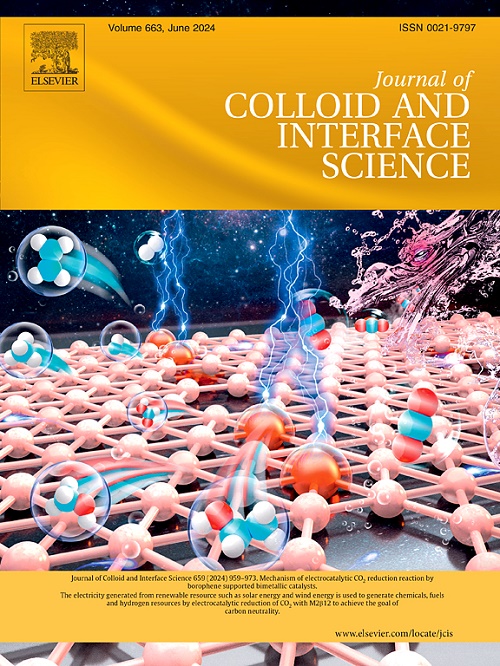Mid-gap levels induced near-infrared response and photothermal catalytic degradation of chlortetracycline hydrochloride by (SnFe2)Ox under solar light
IF 9.4
1区 化学
Q1 CHEMISTRY, PHYSICAL
引用次数: 0
Abstract
We present a comprehensive photocurrent characterization to explore the near-infrared (NIR) response and photothermal effects induced by mid-gap levels in (SnFe2)Ox (SFO) nanoparticles. X-ray photoelectron spectroscopy and diffuse reflectance spectroscopy revealed multiple mid-gap levels due to multivalent Fe ions. The SFO photocatalyst displayed a noticeable temperature rise under NIR irradiation and a considerable photothermal effect across the full solar spectrum during the photocatalytic degradation of chlortetracycline hydrochloride (CTC·HCl). In photothermal catalysis, after 150 min, SFO was able to remove 88% of CTC·HCl (60 mg/L), outperforming photocatalysis (79%) and thermal catalysis (73%). Rapid and slow response processes were observed in the photocurrent characterization under light-emitting diodes of different wavelengths (365–1500 nm), which revealed a clear dependence on the incident wavelength. Furthermore, innovative photocurrent response tests using alternating ultraviolet (UV) and NIR irradiation revealed that, in the presence of mid-gap levels, UV-excited electrons can aid NIR-excited electrons in achieving cascaded electron transitions, enhancing the utilization of NIR-excited electrons. Our findings demonstrate that mid-gap levels effectively improve the utilization of low-energy photons and boost the photocatalytic process through photothermal effects and increased active charge carrier density.
太阳光下(SnFe2)Ox 对盐酸金霉素的中隙电平诱导近红外响应和光热催化降解
我们介绍了一种全面的光电流表征方法,以探索 (SnFe2)Ox (SFO) 纳米粒子的中隙水平所诱导的近红外(NIR)响应和光热效应。X 射线光电子能谱和漫反射光谱显示了多价铁离子导致的多个中隙水平。在光催化降解盐酸金霉素(CTC-HCl)的过程中,SFO 光催化剂在近红外辐照下显示出明显的温升,并在整个太阳光谱范围内显示出相当大的光热效应。在光热催化过程中,150 分钟后,SFO 能够去除 88% 的四氯化碳-HCl(60 毫克/升),优于光催化(79%)和热催化(73%)。在不同波长(365-1500 纳米)的发光二极管下进行的光电流表征中,观察到了快速和缓慢的响应过程,显示出与入射波长的明显相关性。此外,利用紫外线(UV)和近红外(NIR)交替辐照进行的创新光电流响应测试表明,在存在中隙电平的情况下,UV 激发的电子可以帮助 NIR 激发的电子实现级联电子转变,从而提高 NIR 激发电子的利用率。我们的研究结果表明,中隙电平能有效提高低能光子的利用率,并通过光热效应和增加活性电荷载流子密度促进光催化过程。
本文章由计算机程序翻译,如有差异,请以英文原文为准。
求助全文
约1分钟内获得全文
求助全文
来源期刊
CiteScore
16.10
自引率
7.10%
发文量
2568
审稿时长
2 months
期刊介绍:
The Journal of Colloid and Interface Science publishes original research findings on the fundamental principles of colloid and interface science, as well as innovative applications in various fields. The criteria for publication include impact, quality, novelty, and originality.
Emphasis:
The journal emphasizes fundamental scientific innovation within the following categories:
A.Colloidal Materials and Nanomaterials
B.Soft Colloidal and Self-Assembly Systems
C.Adsorption, Catalysis, and Electrochemistry
D.Interfacial Processes, Capillarity, and Wetting
E.Biomaterials and Nanomedicine
F.Energy Conversion and Storage, and Environmental Technologies

 求助内容:
求助内容: 应助结果提醒方式:
应助结果提醒方式:


